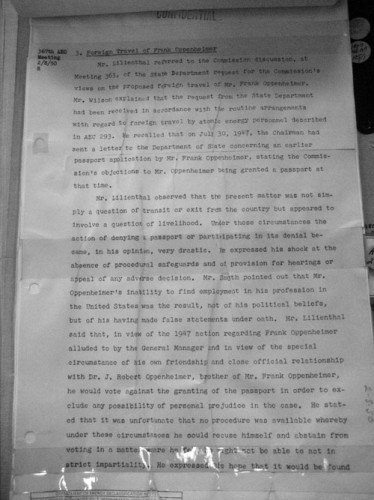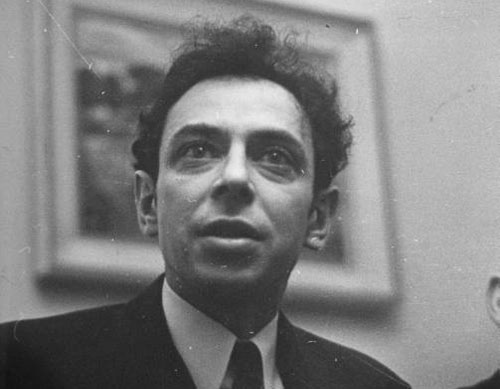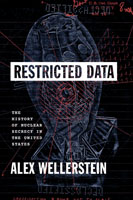It’s hard not to dramatize the relationship between J. Robert Oppenheimer, father of the atomic bomb, and Frank Oppenheimer, uncle of the atomic bomb. Their lives were entwined in ways that went beyond the merely filial. Frank’s interests in physics were always overshadowed by his brother’s prowess; Frank’s dalliances with Communism may have been at the seat of Robert’s own political undoing.1
Robert’s life is well known: three years at Harvard, then to Europe, then to California, then to Los Alamos, then to Princeton, then to ruin.2 Frank’s is less well-known, but perhaps even more fascinating. Frank followed in Robert’s footsteps: he studied physics; he took up horseback riding; he was drawn to left-wing causes; he eventually became a Communist Party member, to Robert’s apparent dismay. He worked at Lawrence’s Radiation Laboratory during the war, and followed Robert to Los Alamos, helping to plan for the Trinity test. In 1947, he was outed as a Communist — a charge he initially denies. By 1949, though, he admitted being a member in the 1930s.
In the same year, J. Robert Oppenheimer appeared before the House Committee on Un-American Activities (HUAC), with a young Richard Nixon as one of the Representatives in attendance. Robert was a friendly witness — in part because HUAC had already been told by the Joint Committee on Atomic Energy to keep away — testifying about possible Communist activity at the Berkeley Radiation Laboratory. Early in the proceedings, they came to the question of Frank:
MR. TAVENNER: What is your brother’s name?
DR. OPPENHEIMER: Frank Oppenheimer.
MR. TAVENNER: Is he likewise a scientist?
DR. OPPENHEIMER: Yes, he is.
MR. TAVENNER: Did he ever ask you how you felt about furnishing information intended for use by Soviet agents?
DR. OPPENHEIMER: No, he did not.
MR. TAVENNER: Is your brother a member of the Communist Party?
DR. OPPENHEIMER: He is not a member of the Communist Party, to the best of my knowledge.
MR. TAVENNER: Are you speaking of the present time?
DR. OPPENHEIMER: I am, sir.
MR. TAVENNER: Was he a member of the Communist Party in the past?
DR. OPPENHEIMER: Mr. Chairman, I will answer the questions you put to me. I ask you not to press these questions about my brother. If they are important to you, you can ask him. I will answer, if asked, but I beg you not to ask me these questions.
MR. TAVENNER: I withdraw the question.
MR. WOOD: Very well.
MR. TAVENNER: That is all.3
Pretty intense, no? Just wait — it gets worse.
Frank Oppenheimer was essentially blackballed from university positions in physics in the United States. Universities that considered hiring him would get a probably-not-too-polite visit from a local FBI agent who would spill the “facts” on Frank’s Communist activities and probably-not-too-politely imply that vast bad P.R. would be dropped on their heads should they hire such a fellow.
Well, if the United States doesn’t want him, why not leave? Surely the ambitious physics programs of Brazil or India would love to have an Oppenheimer brother on staff, past-Communist or not.
Sounds like a good plan. Except for the fact that Frank Oppenheimer, having been connected with the creation of the atomic bomb, was at the whim of the U.S. Atomic Energy Commission to decide whether he could be allowed to leave the country. After all, couldn’t he be a security risk? What if he was skipping town?
And thus we come, at long last, to our document of the week. In early 1950, Frank Oppenheimer wanted to go to India with Bernard Peters (another Oppenheimer grad student who was also having the McCarthyism blues) to do cosmic ray research with Homi J. Bhabha, the famed Indian physicist (who should not be confused with Homi K. Bhabha, the post-colonial theorist). The matter was twice brought before the Commissioners of the AEC: should Frank Oppenheimer and Peters be allowed to go?
Peters was given a pass. But Frank, not so much. You have to read the original two meeting summaries to really appreciate it fully:4

Click the image to read the PDF. Sorry about the reflective tape — a document photographer’s worst enemy! Also probably not so hot for archivists either.
The meeting minutes are only four pages long, but emotionally agonizing.
AEC Commissioner Henry DeWolf Smyth starts out meeting 363 by noting that the AEC was supposed to restrict the travel of formerly Q-cleared scientists only when they thought there was an element of risk involved — that they might flee the country. In the case of Frank, he thought the India trip seemed like a “plausible scientific project,” and his knowledge of the bomb was stale anyway, having left Los Alamos in September 1945.
Lewis Strauss, of course, saw “an element of security risk” in Frank’s proposed visit, and “that the doubt in such a case should be resolved in favor of the government” — that the AEC should disallow the State Department from granting Frank a passport. Gordon Dean agreed with Strauss, as was usual on security matters. Sumner Pike and Smyth both felt that there was no problem in letting Frank go. So there the matter stood: a tie vote of 2 for and 2 again. The tie-breaking vote would fall onto AEC Chairman David Lilienthal, who wasn’t at the meeting.
Six days later, they met again. Lilienthal, a close friend of Robert’s and a sympathetic ear, noted that “the present matter was not simply a question of transit or exit from the country but appeared to involve a question of livelihood.” He protested the lack of procedural safeguards or oversight — they could, on a whim, participate in the derailment of Frank’s career, even internationally. (Henry DeWolf Smyth says that Frank’s problems aren’t because he was a past-Communist, but because he lied under oath. That’s not exactly a clear distinction in the 1950s, of course.)
But here’s the kicker. Commissioners Smyth and Pike are willing to let Frank go to India. Strauss, and Dean are not. What does Lilienthal do?
…in view of the special circumstance of his own friendship and close official relationship with Dr. J. Robert Oppenheimer, brother of Mr. Frank Oppenheimer, he would vote against the granting of the passport in order to exclude any possibility of personal prejudice. He stated that it was unfortunate that no procedure was available whereby under these circumstances he could recuse himself and abstain from voting in a matter where he felt he might not be able to act in strict impartiality. He expressed the hope that it would be found possible to set up an improve procedure which would allow an applicant for a passport to be heard and to appeal any adverse decision.
In other words, because Lilienthal was friends with Robert, he couldn’t help but to vote against Frank, so as to not be accused of impartiality. The horrid connection between the filial and the political, once again. And so with 3 against the visa being granted, and only 2 for it, it was decided that Frank could not go to India, could not try to resurrect his physics career outside of McCarthyist USA.
Frank’s timing, it should be noted, was especially unfortunate. February 2, 1950, the day they first debated his passport, was the day that the AEC learned that the UK was about to announce the arrest of Klaus Fuchs. The H-bomb debate had just ended a few days prior with Truman’s decision. Lilienthal himself was already on his way out as Chairman, tired of the impossibility of being a liberal technocrat at the height of the Cold War. All of that adds up to it being a very bad time to be a former Manhattan Project scientist with a Communist background trying to leave the country.
Frank’s story, though, does have a happy end. In desperation he sold one of the famed Van Goghs inherited from his father, and became a cattle rancher. It’s a long road from physics, but for a man who loved horses and the open West, it’s not too bad. Years later, Frank would edge back into physics teaching, and eventually would found the Exploratorium in San Francisco, a cathedral devoted to the wonder of science.
Robert’s story gives us a stratospheric rise and an Icarus-like fall. Frank’s is something different: a slower rise, always in the shadow of his more brilliant, more clever brother, followed by a terrible fall which preceded and predicted Robert’s own fall. But after years away from the center, Frank came back, and made something wonderful out of his life nonetheless.
Would Robert have eventually redeemed himself if he had not died of throat cancer, or would he have wallowed in gin-soaked martyrdom? It’s impossible to say. But when it comes to legacies, I find myself preferring Frank’s.
- Has it truly been a decade since Brotherhood of the Bomb was published? I saw Gregg Herken give a talk about it — and his thesis that Frank was the unnamed contact in the Chevalier episode — back in 2002, at UC Berkeley, when I was an undergraduate. And through consultation with my wife, I find out she was at the same talk! It may have been the first talk we both attended simultaneously, long before we began dating. How time flies for two nuclear geeks. [↩]
- Well, technically, then to the Virgin Islands, but from Sherwin and Bird’s description of how that was, it sounds pretty ruinous. [↩]
- Tavenner is Frank S. Tavenner, Jr., counsel for the Committee. Executive Session, United States House of Representatives, Committee on Un-American Activities (7 June 1949), on 14. [↩]
- Source: Excerpt from Minutes of AEC Meetings No. 363 (2 February 1950) and No. 367 (8 February 1950), in RG 326, Records of the Atomic Energy Commission, National Archives and Records Administration, General Correspondence 1946-1951, Box 10, “Foreign Travel By Personnel.” [↩]




[…] brother, Frank, for example, found himself essentially blacklisted from all research, even from the opportunity to leave the country and start over. (It had a happy ending, of course, because without being blacklisted, he might never have founded […]